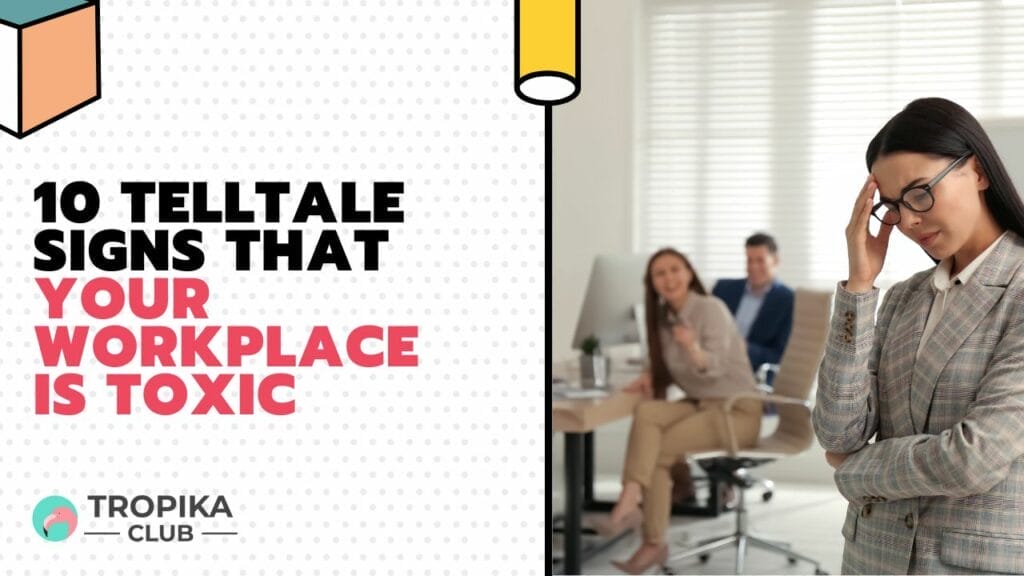10 Telltale Signs that Your Workplace is Toxic

No Time to Read? Here’s a Snappy Summary of This Article
- Excessive Micromanagement: Constant scrutiny stifles creativity and undermines trust, leading to demotivated employees and hindered productivity.
- Lack of Transparency: Secretive decision-making fosters suspicion, breeding a culture of gossip and eroding team cohesion.
- Persistent Negativity: A pervasive atmosphere of complaints and pessimism drains morale and hampers innovation and progress.
- High Turnover Rate: Frequent departures signal dissatisfaction, disrupting workflow and impeding long-term success and stability.
- Blatant Favoritism: Visible favoritism fuels resentment, dividing the team and hindering collaboration and fair advancement opportunities.
- Ignored Feedback: Dismissal of constructive criticism stifles growth, perpetuating issues and inhibiting positive change and development.
Table of Contents
- No Time to Read? Here’s a Snappy Summary of This Article
- 1. Excessive Micromanagement
- 2. Lack of Work-Life Balance
- 3. Constant Negativity and Gossip
- 4. Lack of Transparency and Communication
- 5. Favoritism and Unfair Treatment
- 6. Lack of Growth Opportunities
- 7. Bullying and Harassment
- 8. Unrealistic Expectations and Workload
- 9. Lack of Recognition and Appreciation
- 10. High Turnover Rate
- Meanwhile, Check Out Tropika Club’s Ecosystem of Websites
Introduction
In the fast-paced corporate landscape of Singapore, a toxic work environment can be detrimental to both your mental well-being and career growth. While every workplace has its challenges, there are certain red flags that should not be ignored. From micromanagement to office politics, these telltale signs can indicate a toxic culture that may be holding you back. In this article, we’ll explore 10 common indicators of a toxic workplace, drawing from the experiences of Tropika Club Magazine’s readers and our own expertise in the Singaporean corporate scene.

1. Excessive Micromanagement
A toxic workplace often breeds micromanagers who constantly look over your shoulder, questioning every decision you make. This lack of trust and autonomy can be demoralizing, hindering your ability to grow and take ownership of your work. As one of our readers shared, “My boss would scrutinize every email I sent, making me feel like I couldn’t do anything right.”

2. Lack of Work-Life Balance
In Singapore’s competitive corporate culture, long hours and unrealistic deadlines can become the norm in a toxic environment. When your workplace fails to respect your personal time and well-being, it’s a clear sign that something is amiss. “I found myself working late into the night, sacrificing weekends, and missing out on important family events,” confessed a reader.

3. Constant Negativity and Gossip
A toxic workplace thrives on negativity, with gossip and rumors spreading like wildfire. This creates an atmosphere of mistrust and tension, making it difficult to focus on your work. “It felt like everyone was talking behind each other’s backs, and the negativity was just draining,” shared a reader who experienced this firsthand.

4. Lack of Transparency and Communication
Effective communication is crucial in any organization, but in a toxic workplace, information is often withheld or distorted. This lack of transparency can lead to confusion, mistrust, and a general sense of being kept in the dark. “I never knew what was really going on, and important decisions were made without any input from the team,” lamented one reader.

5. Favoritism and Unfair Treatment
In a healthy workplace, everyone should be treated with respect and given equal opportunities. However, in a toxic environment, favoritism and unfair treatment can run rampant. “It didn’t matter how hard I worked; certain people always seemed to get preferential treatment,” shared a reader who experienced this firsthand.

6. Lack of Growth Opportunities
A toxic workplace often stifles personal and professional growth, leaving employees feeling stagnant and unfulfilled. “I felt like I was stuck in a dead-end job, with no opportunities for advancement or learning new skills,” confided one reader.
_
Read Also:
6 Things Everyone Gets Wrong About Cats
_

7. Bullying and Harassment
Bullying and harassment, whether verbal or physical, have no place in a healthy work environment. Unfortunately, these behaviors can thrive in toxic workplaces, creating an atmosphere of fear and intimidation. “I dreaded going to work because of the constant belittling and insults from my manager,” shared a reader who experienced this firsthand.

8. Unrealistic Expectations and Workload
While challenging work can be rewarding, a toxic workplace often sets unrealistic expectations and piles on an unsustainable workload. This can lead to burnout, stress, and a general sense of being overwhelmed. “I was expected to juggle multiple projects with impossible deadlines, and my concerns were always brushed aside,” confessed a reader.

9. Lack of Recognition and Appreciation
In a healthy workplace, hard work and achievements are recognized and appreciated. However, in a toxic environment, these efforts often go unnoticed or are taken for granted. “No matter how much I contributed, it was never good enough,” shared a reader who felt undervalued.

10. High Turnover Rate
A high turnover rate can be a telling sign of a toxic workplace. When employees are constantly leaving, it’s a red flag that something is amiss. “It seemed like every few months, someone new was quitting,” observed a reader who witnessed this firsthand.
Conclusion
Recognizing the signs of a toxic workplace is crucial for your well-being and career growth. Whether it’s excessive micromanagement, lack of work-life balance, or unfair treatment, these red flags should not be ignored. By being aware of these telltale signs, you can make informed decisions about your professional journey and prioritize a healthy work environment that fosters growth, respect, and fulfillment. Remember, your workplace should empower you, not drain you. If you find yourself in a toxic situation, don’t hesitate to explore better opportunities that align with your values and aspirations.

Frequently Asked Questions (FAQ)
Q: How can I address toxic behavior in my workplace?
A: Start by documenting incidents, then address concerns with HR or a trusted supervisor to find solutions collaboratively.
Q: Can toxic workplace environments impact my mental health?
A: Yes, prolonged exposure to toxicity can lead to stress, anxiety, and even depression, affecting overall well-being.
Q: Are there cultural differences in recognizing workplace toxicity?
A: Yes, cultural norms may influence how toxicity manifests, but common signs include lack of transparency and high turnover rates.
Q: What are the long-term effects of working in a toxic environment?
A: Employees may experience decreased job satisfaction, hindered career growth, and a negative impact on personal relationships.
Q: How can toxic workplaces affect company productivity?
A: Toxic environments can lead to decreased morale, increased absenteeism, and diminished teamwork, ultimately impacting company performance.
Q: Can workplace toxicity be prevented or mitigated?
A: Yes, fostering open communication, promoting a positive company culture, and providing support resources can help prevent and address toxicity.

Have an Article to Suggest?
Tropika Club is always looking for new and exciting content to feature in their magazine and they value the input of our readers. If you have any noteworthy content or articles that you believe would be a great addition to Tropika Club’s magazine, we are open to suggestions and encourage you to reach out to us via email at [email protected]. By doing so, Tropika Club values your expertise and knowledge in the matter and appreciates your willingness to help. We will review your recommendations and update our list accordingly
Meanwhile, Check Out Tropika Club’s Ecosystem of Websites
Tropika Club Magazine – Tropika Club Magazine is a Singapore-based publication that features articles on a wide range of topics with a focus on local businesses and content for the region. The magazine emphasizes supporting local businesses through its #SupportLocal initiative, which includes coverage of everything from neighborhood hawker stalls to aesthetic clinics in town. In addition to highlighting local businesses, Tropika Club Magazine also covers a variety of local content, including beauty, lifestyle, places, eats, and what’s on in Singapore and the Asia Pacific region.



